Appreciatings

Charles Deas: Long Jakes, "The Rocky Mountain Man" (1844)
"Thank you for helping to make my old year happier!"
I had to be taught to appreciate. I was not born with the skill. It wasn't until I was in my thirties that I learned the first thing about how to congruently accomplish appreciating, and I still feel at a disadvantage when challenged, as I am this morning, to extend some genuine Appreciatings. This being the last day of this year, I've decided to attempt the opposite of what Auld Lang Sine asks. Should old acquaintance be forgot? I suggest that old acquaintances should properly be warmly recognized with Appreciations on the last day of the year. Every pundit known to man and beast has already submitted their regrets for the year now passing, for it was a remarkably disappointing year in many respects—most, maybe, but hardly entirely. For me it was a year of tremendous personal growth influenced by my encouraging audience, the majority of whom distinguished themselves as repeat offenders, showing up and even coming back again and again and again. What gives?
I started PureSchmaltz as a form of giving.
HealthScare

Ernest Board: Albucasis blistering a patient in the hospital at Cordova. (Circa 1900).
"It's just there, best avoided, forever poised ready to serve somebody else."
I called in sick yesterday, a rare occurrence. Like anyone, I tend to work right through sensations of illness, never knowing if I'm sick or just tired, or both. My basic strategy for treating any apparent anomaly amounts to giving it a day or two to see if it gets any worse and if it gets any worse, to give it another day or two to see if my condition further degrades, the upshot being that I almost never reach a point where I seriously consider consulting with anyone other than The Muse, who maintains her own superstitions and folk remedies. A doctor's visit requires the rough equivalent of an act of a divided Congress to schedule and these generally amount to me failing to describe and the doctor blindly prescribing, with me reporting side effects resulting from the last round of prescriptions. I tend to spend much of my doctor face time trying to convince the nurse practitioner why I'm not a good candidate for her current pet treatment. Even if I have sleep apnea, a condition I've yet to muster a belief in, I would never consent to wearing an electric muzzle to bed. A man must somehow maintain his dignity. I contend that I'm not sick, a condition modern medicine struggles to cope with.
Still, I do have my days when whatever ails me actually ails me.
ThePetulances

Paul Delaroche: Napoléon abdicating in Fontainebleau, 1845
"Nobody ever rides anywhere worth going to on the back of grudges fueled by ThePetulences."
We're each and all heading in the same direction. Lowly and highborn, professional and gig, smart and stupid, born equal and perhaps steadily heading downhill thereafter. If circumstances don't get us, time certainly will. The devout contend that we're heading for a better life following this one, sure and certain of ample reward for whatever humiliation life heaps upon them. All will be humbled, though the humiliation part seems entirely optional. Some become powerful, after a fashion, though none ever powerful enough to make good on any delusion about what that power might purchase. Most learn that power carries a counterbalancing powerlessness, with only ThePetulences ever bringing the two into balance. One might pretend so convincingly as to convince them self, less frequently someone else, rarely a majority. The positioning matters, since the nonbelievers can natter even noble intentions to shreds. It generally behooves anyone wielding power to handle it with greater care than their charter implies they might, for asserted might naturally translates into neither right nor acceptable. Power either humbles or humiliates. An absent humility guarantees eventual humiliation.
Not everyone gifted with authority seems to understand the humility it demands of them, or prove capable of providing it.
Disposaling

Eugene Berman, Italienne Symphony II (1940)
"The cats receive an hour's free entertainment …"
I received perhaps the greatest gift ever when my email inboxes disappeared from my iPhone on Christmas Eve. Long a point of continuing frustration, their sudden absence felt freeing. I know, I'm supposed to grieve the loss of 3500 messages I had never been able to keep up with, but I could never keep up with them, and though I retain a sense that something important must have been hidden in there somewhere, besides an irregular seli-annual purge of the contents, I never found in there anything like A Publisher's Clearinghouse announcement that I'd become an instant millionaire. Mostly, detritus resulting from some fleeting past association that had produced sometimes daily updates from which I'd never figured out how to unsubscribe and trivial updates from the homeowner's association announcing that some member or another had received approval to install new windows, I only felt oppressed by their presence. My occasional review of the inboxes, never a regular part of my regimen, left me more skilled at deleting without reading them, hundreds each day, it seemed, hardly a skill much prized in anyone's marketplace. I found some retained on my laptop, but felt free that my iPhone would no longer present this overwhelming doodlebug hole of a challenge. Praise be, indeed!
Little of the garbage I generate so easily and permanently disappears.
AlternateUniverses

Elihu Vedder: Mural, Lobby to Main Reading Room, Library of Congress Thomas Jefferson Building, Washington, D.C.
Main figure is seated atop a pedestal saying "CORRUPT LEGISLATION".
"I might have always been more potential than being."
None of my life makes any sense without accepting the likelihood that AlternateUniverses exist. I might instead attempt to follow a thread I presume to connect the disparate portions of my existence so far, but that story, one attempting to relate each piece to every other, strains credulity more than the AlternateUniverses alternative; it would not make believable fiction. I'm not arguing in favor of wildly divergent spaces, but subtly different ones, at least for the most part. I've thrived in places I formerly considered uninhabitable and found almost uninhabitable places touted as the best Earth has to offer. I feel fortunate to have experienced such tremendous difference. I've struggled with pretty much every transition, for within each I first searched for stuff that could not be found there because it didn't exist there, but I eventually adapted after some fashion and found myself settling in, usually in spite of initial instinctively unhelpful adaptation attempts. I found that I had to let go of some expectations to appreciate each place. What appeared, for instance, on my first visit to New Mexico, as a culture full of crappy gardeners later came to seem one which had adapted well to the local terrain. There are no English Country Gardens thriving in parched high desert country.
I feel proud to report that I spent considerable time over several years writing and reading in the Main Reading Room of The Jefferson Building of DC's Library of Congress, by far the most complete library ever assembled.
Done-d

Caravaggio: Saint Jerome in Meditation (1606)
"Doneness, a negotiated settlement."
Back when I consulted with projects, I noticed the curious relationship every project seemed to have with doneness. Similar to each project's initial charter, none managed to muster a very complete description of their destination. "What will 'done' look like," I'd ask, as if that constituted a reasonable question. And most accepted the question with a tinge of guilt, just as if they'd known that they really should have answered that question as a precedent before beginning. None had very clearly described their requisite initial conditions, either, which might just be a polite way to say that their project had gone off half-cocked. They'd garnered permission to start, even received funding, with hardly a half-assed notion of what they would be doing. I came to understand this state as a necessary one, and in no way evidence of the least bit of aberrance. Everyone did it this way for the simple reason that no alternative existed or could be accessed in real or any other time. Sure, each effort could improve by better defining its identity and its objective, but no project ever successfully satisfied their aspiration to have actually done either. Done, I came to understand, was not a state, though one might negotiate into an acceptance that they had achieved some good-enough state of description, but only after having achieved that state, never in anticipation or at the moment of arrival. Done is a reflection, a tardy recognition, not a discernible or definable place. Stuff gets Done-d, never done.
Done-d usually feels like an abandonment to me.
GraveMisgivings

Daniel Maclise: Othello, Desdemona and Emilia (1867)
" I will continually eliminate intrusions and remulch familiar dirt …"
As near as I can tell, and I'm the only one who could possibly know, I felt fairly well suited to this world through the spring of 1963. Since then, things have maintained a steady downward trajectory. By the fall of that year, I registered my first failing grade, an outcome I felt certain was coming before completing the transfer into Junior High, a clear impending disaster against which I possessed no defenses. Junior High attempted to demonstrate that one could successfully educate kids by removing the center of their existence and replacing it with something euphemistically labeled Home Room. There never was anything even the least bit homey about Home Room. It seemed an utterly alien environment, a place where people who would never very well know each other gathered at the beginning of each school day for the purpose of taking role and listening to threatening screeds the Principal broadcast over the school-wide PA system. It set a distinctly prison camp tone, one which unavoidably soured the rest of each day's experience. I started majoring in hiding out, a field of study in which I came to excel. I would have preferred that they offered a letter in that endeavor, but, alas, they did not.
I matriculated into High School, which was Junior High on steroids.
Routine

M. C. Escher: Relativity (1953)
"I might find myself more present then but also much less here …"
I refer to my Routine as sacred. I work hard to keep it as sacred as it feels, though it's almost entirely composed of distinctly secular activities. I'm no monk, but I do spend the majority of my time alone. Early mornings, I've grown accustomed to padding around this place in darkness, for I have no need to turn on lights. I've traversed these rooms enough that my muscle memory mostly sees my pathways for me, no real need to supplement that sixth sense. The cats see fine in near total darkness, so they seem unimpressed with my prowess. I guess I impress myself, though. I exhibit evidence that I'm a townie here, I have enough history to seem prescient to myself. I know which drawer holds whatever kitchen utensil I might need. I might even inhabit what some would deride as a rut, but it's MY rut and I find living in it pleasing.
The impending HeadingHomeward will exchange this reliable old milk cow of a Routine for the equivalent of unproven magic beans.
Sh!t

Utagawa Kuniyoshi: Takiyasha the Witch and the Skeleton Spectre (circa 1844)
"Assets to assets, dust to dust."
Most possessions more possess their owner than are possessed by any owner. Possession might remain nine-tenths of the law, but it buys little, though it does occupy space. The more possessions one has, the more space one needs to contain them, and the vast majority of that stuff just sits, never referenced, never touched. My folks' place, the house within which I grew up, eventually became a museum dedicated simply to containing an amazing inventory of long-unused stuff. In their final few years, neither my mom nor my dad could get to either the basement or the second floor, so those parts of the place, fully two-thirds of it, simply collected dust. After my dad died and my mom finally begrudgingly accepted the necessity of moving into an assisted living facility, the family quickly cleared out the place we'd long-imaged a repository of long-forgotten treasures. We found a few treasures, but we mostly uncovered tombs to long-ago summers. A set of long-illegal lethal lawn darts. Canned plums from the summer of 1965, still apparently good after more than forty years spent on a shelf in a far back corner of the basement. Most of the imagined treasures had turned to Sh!t by the time we started exorcizing them along with their demons.
That's the thing about possessions, they need to maintain at least a modest velocity or they inevitably degrade.
Heading

Elihu Vedder: The Questioner of the Sphinx (1863)
"One must drag a past into their dreams or they never have a chance of coming true."
If someone was manning the helm on this heap and I was its captain, I might feel moved to command that a course for home be set. "Give me the heading for home," I'd bark, and we we'd be on our way. Nobody's at the helm of this heap, though. The Muse and I do what we can, but neither of us have ever shown any particular penchant for navigation. Vectoring chased me off. Too much complicated math. The Muse almost exclusively employs persistence. She tends to get wherever she's going, but rarely by any expedient course. Her path meanders and leverages happenstance, and she'd very likely have it no other way. We're not really into efficiency here, but into collecting the stories our adventures are likely to tell us. The less predictable, the better.
We've gone and done it now, as my mother once might have derisively said.
BegendingAgain

Gustave Doré: Don Quixote amid his fantasies of chivalric romance, the frontispiece to the 1863 Paris Hachette edition of Don Quixote.
"The Pilgrim travels to find himself. He was lost when he left and hoped to be found by fleeing into something greater than he ever was or ever hopes to become. A reckoning occurs along the way, a reconciling, shell with self, restoring something somehow formerly lost along the way. It never matters why." From Pilgrimage, the first WhatNext Posting, 9/21/2020
"Is it ending as I intended?"
I never seem to know how to begin or end anything. I prefer continuums, endless loops, Ouroboroses forever nibbling their own tails. I don't spring cleanly out of any starting blocks. I likewise tend to miss the moment when I cross the finish line, continuing races longer than strictly necessary for them to end. I behave like Wylie Coyote, forever hatching half-again too clever plans and overrunning my mesa top again and again and again. I label this tendency Begending, a blending of both beginning and ending, neither, really, and also both. I deeply respect the inherent ambiguity experience brings, lessons not so much learned as still learning, without convincing conclusions. Impressions remain, mixed in with much inert material. I might wonder forever without ever concluding what any of anything "really" means. As my dear departed friend Jamie used to insist, it was just what it was and, forever, is just what it is, whatever that was and is. The purpose of any Pilgrimage might not be finding the purpose of any pilgrimage.
The purpose of WhatNext might have been its creation, not its conclusion.
Blecknology

Elihu Vedder: Soul in Bondage (1891-92)
" … I wondered what might become of me next."
As I was driving by a tiny one bedroom cinder block ranchette, I saw through the front window a flat screen television so enormous that anyone watching it would have to stand in the yard across the street to gain adequate focal distance to see the action on it. Technology possess this sort of strange attraction. It seems as if the specs outweigh utility. We presume that bigger (or tinier) must be better and higher definition, superior, though in practice, beyond a rather modest level of clarity, television becomes increasingly unbelievable, like those old 'shot on video' movies where everything seemed in shockingly sharper focus but lacked a proper patina. When color began replacing black and white in film, the purpose of the medium flipped. It's no real trick to recognize anything represented in black and white, and many details irrelevant to the purpose of the production become much more prominent with color representation. The story usually suffers, becoming more spectacle than substance. The purpose was never perfect representation, but performance and meaning. There's little entertainment value in being able to pick out nose hairs on the bad guy's horses as they race by on the screen, or so it might seem. Meaningless prevailed.
Once that focal point shifts from the purpose of the performance toward higher-definition superficialities, more than an essential subtlety gets lost.
EmptyNexting
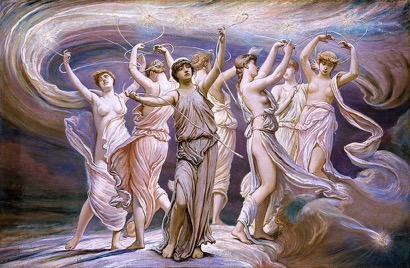
Symbolist painter Elihu Vedder: The Pleiades (1885)
" … not yet at the end of my hopefulness, either."
Change, Family Therapist Virginia Satir insisted, rests upon the clear, albeit temporary acceptance of the way things are. I might anticipate, even project futures, but I will be wise to consider that whatever differences might emerge next will have extended from whatever came before them. Though life sometimes seems terribly disjointed, connections remain no matter how disruptively any future seems to manifest. One probably never successfully escapes one's roots, nor need to. Still, I live a considerable portion of my life in anticipation, warm or chilling, and rarely solely within any moment. With three short days—the shortest days of this year so far—remaining in my WhatNext Series of writing (this waning quarter's focus of my writing), I'm still anticipating what might come next. I deliberately avoided originally posing my WhatNext as a question, but as a purposefully ambiguous statement which might, in certain light, certainly seem like a question, but in others a benign label or even an exasperation. Notice how it's lacking punctuation. WhatNext has certainly proven to represent each of those sentiments and more.
This time has seemed a period which rendered prediction not necessarily impossible, but at least unbelievable, or perhaps simply difficult to believe.
ProHibitions

Lord Nicolas the German (Donnus Nicholas Germanus), cartographer
Johann the Blockcutter of Armsheim (Johannes Schnitzer or Johannes de Armssheim), engraver:
The world map from Leinhart Holle's 1482 edition of Nicolaus Germanus's emendations to Jacobus Angelus's 1406 Latin translation of Maximus Planudes's late-13th century rediscovered Greek manuscripts of Ptolemy's 2nd-century Geography.
"I preemptively infringe upon my own freedoms so nobody else has to."
By the time someone gets to my advancing age, they've probably produced a long list of personal ProHibitions. Some came from well-intended professionals' advice, but most evolved into being, based upon emerging convictions and experiences. I learned at seventeen that there's nothing much worth discovering at the bottom of any bottle of Southern Comfort, the most misleadingly named beverage in the history of human civilization. I learned how to smoke before I learned how not to. Learning not to proved way harder, as it seems for many things. Bad habits are first good habits, or, if not necessarily good habits, they universally seem like good ideas at the time. They show their insidious side later, after they've weakened your resolve. They might do it that way for the sheer entertainment of it.
I've been collecting cautionary experiences since I started experiencing.
Ease
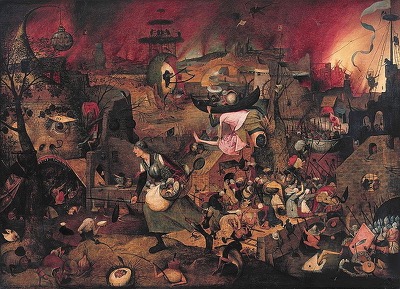
Pieter Brueghel the Elder: Dulle Griet [Mad Meg] (1563)
"If it's really important, I ask The Muse to run the gauntlet …"
Much has been made of the Ease of online shopping. I cannot validate this claim because online shopping still seems to me the very antithesis of Ease. This Damned Pandemic Lockdown reinvigorated my online shopping curiosity, though, so I've recently been reengaging to learn if anyone has engineered any Ease into their interfaces. I'm the guy who, when checking out at Whole Foods® explains that he has not (yet) figured out the Amazon One-Click® app yet. They either take my word that I'm a member, the person in line behind me loans me their identity, or I just take along The Muse, who just seems to know how those sorts of things operate. Amazon has long held my admiration for the absolute hostility of their user interface, which seems more hazard to commerce than intelligent assistant. Their design became the burgeoning online shopping industry's standard for online commerce, effectively disqualifying me from participating. I'm usually beyond caring.
The vacuum died last weekend, so I went online shopping for a replacement.
HesitantLede

Moses: Woodcut from a single-sheet print by the Memmingen printing company Kunne (15th century)
"I'm cheering for some serious foot dragging next."
Most accounts characterize Moses as a distinctly hesitant leader. He was forever fleeing into his meeting tent to confer with The Almighty, continuously uncertain about his next move, his people endlessly complaining about his leadership. He seemed to fake it a lot. Some translations report that he remained unaware that his face exhibited a certain radiance obvious to anyone who met him, but apparently not reflected in any mirrored surface. He doubtless led his people and even survived a face-to-face audience with God, but he comes across as an inveterate foot dragger. How else could it have possibly taken forty and more years to cross the freaking Sinai, which is just over two hundred klicks wide? Baby steps? Yea, baby steps.
When the word leader comes up in polite conversation, though, it seems most likely that one might attach a different connotation.
TheEnemyWithin

Peter Paul Rubens: Massacre of the Innocents (1611–12)
" … getting even only leads to slaughtering innocents …"
They goad. They spout gibberish. They firmly believe in flimsy fictions and claim to be prepared to lay down their lives to defend them. I imagine that they performed poorly in school and so felt demeaned there. The elites who harshly judged them in class became evidence of an upper class to which they would be forever denied access. They took menial jobs, ones which only almost paid the bills. They did the heavy lifting whenever an elite got a bug up his ass. They actually fought the wars without purpose. They witnessed their comrades' deaths. Perhaps they acquired a first class case of Post Traumatic Stress Disorder which just added another layer onto an ever-growing grudge. They believed that owning guns was both an honor and a right, a little something to equalize what had always been an unfair fight. They vowed to fight. They exclusively slaughter innocents, innocence.
They goad to take the upper hand.
TheNarrator

Anonymous: Diogenes brings a plucked chicken to Plato. (19th century)
According to Diogenes Laërtius’ third-century Lives and Opinions of the Eminent Philosophers, Plato was applauded for his definition of man as a featherless biped, so Diogenes the Cynic “plucked the feathers from a cock, brought it to Plato’s school, and said, ‘Here is Plato’s man.’ ” When asked about the origin of his epithet, cynic deriving from the Greek word for dog, Diogenes replied that it was given to him because he “fawns upon those who give him anything and barks at those who give him nothing.” From Lapham's Quarterly
"I might need some serious slowing down after this."
It's long been considered wise counsel to understand who's whispering into one's counsellor's ear, for those people narrate that counsellor's experience, often without the counsellor acknowledging the influence. The much-touted still, silent voice, which originates inside, actively interprets, while TheNarrator represent a world pre-interpreted for easy absorption. This Damned Pandemic has rendered my library inconvenient to visit so I've been supplementing my Wreading with audio books. I've been noticing that I listen less critically than I read, as if intaking through my ears bypasses some gatekeeper in my brain. I find fiction even more believable when listening. I find non-fiction much more convincing, though I understand that as a "consumer" of literature, I hold a responsibility to be sorting whatever I'm attempting to absorb. Listening seems to bypass my sorting mechanism.
I find distasteful any medium that does not provide me the means for easily skipping ahead or flipping back.
FatteningGeese

Baldassare de Caro: A hunting still life with a goose, ducks, pigeons, songbirds and a dog in a landscape (Early 18th Century)
"On even the darkest evenings, I light a fresh candle."
The olde carol reports that Christmas is coming and the goose is getting fat. Hardly headline news, that. Feed a goose a freaking dandelion and it will turn that weed into the finest, silkiest Schmaltz. The carol might have more usefully proclaimed that Christmas is coming and you're getting fat, for a human's metabolism seems to shift into goose mode as the winter's holidays approach. Truth told, few of us even try to subsist upon a diet of dandelion buds in any season. As snow falls, we, instead, commence to buying heavy whipping cream by the quart and butters and sugars we haven't bought since this time last year. We refer to our excesses as cheer, which beats drowning them in remorseful tears. We can save our remorse for Lent, wherein we can regret what might seem, there on the cusp of spring, a serious personal shortcoming visiting around Solstice past. In this moment, hearts sing without the slightest sensation of any impending smothering. We have no interest in balancing anything. Let church bells ring, we're celebrating!
Our genome remembers those times before the advent of central heating, when survival required defensive fat layering.
AgingInPlace

Seated figure from Mali, Djenné peoples, 13th century
"Can anyone hope to outrun their fate when AgingInPlace?"
Americans seem a mobile people. Born to migrate, we've always been quick to ditch. We once referred to this tendency as our manifest destiny, which roughly translated into a firm belief that we can only manifest our true selves if we're somewhere else. We identify our sense of place as 'there', definitely not here or even the Old Home Place, and, no, we're still not there yet. We grow up and move away, relocate for professional advancement, even pull up roots at retirement to make another in a seemingly infinite series of attempts to finally locate our ultimate Promised Land. Arriving, though, we find dissatisfaction co-locating again, so we spend about a quarter of each year traveling to see somewhere else, anywhere else, really. We maintain bucket lists of our bucket lists, the purpose of which seems to be to fuel our pleasing dissatisfactions. Here has always seemed more distraction than destination. We ache to be on the road again.
So when This Damned Pandemic came calling and our well-intended public servants started recommending just staying home, a collective, mournful moan arose from at least half of our populous.
MakingHistory
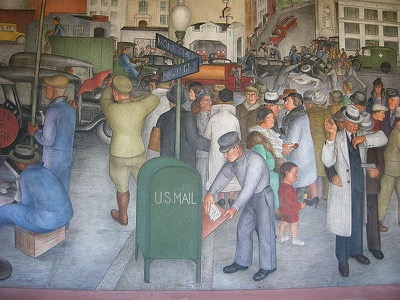
Victor Arnautoff: "City Life" mural, Coit Tower, San Francisco (1934)
"The pointy end trails a very long tail which will never become any different."
Maybe it's an effect of This Damned Pandemic, but I've been catching myself daydreaming lately, frequently. I'll find myself floating in the hallway of my elementary school, surrounded by everything that seemed so unexceptional then. It all seems golden now. The absence of a normal routine might have been forcing me into reliving past ones which all seem like history from here. I do not know how they made that transition into golden past because at ground level, the whole show seemed continuous, flawless. Everyone and everything fulfilled their role perfectly, each precisely as they eventually would become, each act somehow frozen in time yet still convincingly fluid. I remember considering attempting to capture on film the place and time where I came of age, but I never found the time to take those pictures when I was still imbedded within that familiar frame. What seemed normal, even banal then has since become the stuff of barely believable legend. Almost nothing survived intact—I know that I certainly didn't—yet my daydreams seem so crisp and clear that when I finally snap out of one, I can't quite believe that I'm here and not there. I might be both.
I conclude that we're each MakingHistory every blessed second.
SliverBullets
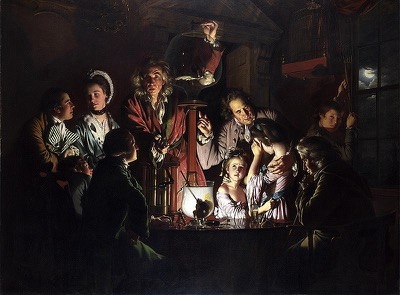
Joseph Wright: An Experiment on a Bird in the Air Pump (1768)
"If we can maintain faith in infinitesimals, we stand some chance."
Invite a halfway decent project manager to a project meeting or an otherwise innocent pandemic and things tend to quickly seem more complicated. While a team or a society easily focus their energy upon some essentially mythical closure, the project manager's having none of that. She'll start asking "and if you achieved that, where would you be?" in long meandering series intended to get people thinking less superficially. You see, most of us firmly believe in silver bullets, even though experts in every field agree that there's really no such thing. Nothing ends like things end on TV, prominently featuring unambiguously good guys, white horses, or native sidekicks. Silver bullets prove impractical for reasons beyond their obvious expense. Lead's almost twice as heavy as silver, its mass much better suited for bullets. Silver bullets would struggle to accurately hit any target, regardless of the skill of the shooter involved. We each suffer somewhat from a form of Fairy Tale Poisoning, and this toxin serves us very poorly.
We've, for the duration of This Damned Pandemic, maintained a reassuring belief in the eventual emergence of a blunting vaccine which would quickly neutralize the threat.
Shimbolism
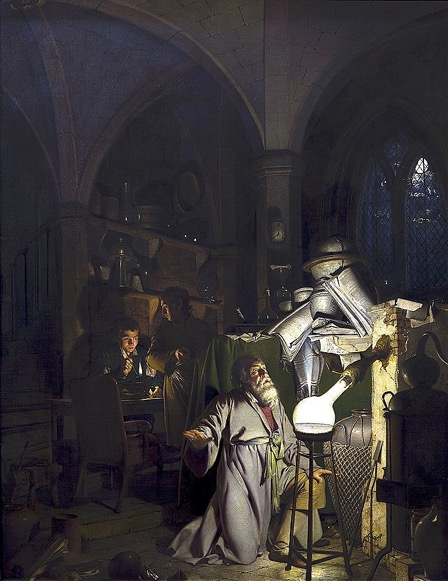
Joseph Wright: The Alchemist in Search of the Philosopher's Stone (1771)
" … not even a cigar is any longer ever simply a smoke."
I admit to no longer being anyone's exemplar of fashion. Few of my garments feature a manufacturer's label, and I did not purchase those to publicly promote my good taste, for I consider any visible manufacturer's label in extremely poor taste, the most primitive form of self promotion by back-handed association, as if Ralph Lauren were somehow personally vouching for me because I'm impractical enough to pay an inflated price for a shirt with a prominent logo in lieu of a front pocket. I'm unable to successfully translate the seemingly subtle cues which, I'm certain, were supposed to clue me in as to with whom I'm having the pleasure of meeting, a form of qualification. My eye can discern a well-cut worsted from a polyester wannabe, and I admit to projecting significant meaning upon each, but most of the rest of the code seems as alien as any avian mating ritual, mere flash and feather. I do understand that it's become somewhat of an imperative now for one to suit up for public display. The message on a hat might make a real difference to some, but I never swallowed the notion that wearing a hat might make anything great the first time, let alone over again.
My usual wardrobe amounts to the same damned thing worn over and over and over again, with no underlying meaning ever intended, other than that it's clean and somewhat well-fitted.
Workarounds
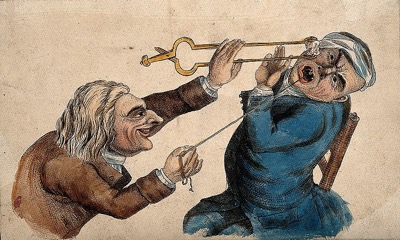
Coloured etching by J. Collier after himself:
A sadistic tooth-drawer frightening his patient with a hot coal causing him to pull away violently and extract a tooth. (1810)
"Not all Workarounds are created equal."
Anything retained long enough becomes the sum of its sustaining Workarounds. Older cars have lost several of their factory-installed features, replaced by alternative parts, some of which might have even been designed to serve the purpose for which they're employed. Exact replacements cannot always be located, so an inventive or desperate mechanic or DIY owner jury-rigs something and calls it good enough. These fixes proliferate as something ages. Houses accumulate a variety of sins to their original design, often under the aegis of "home improvement." Some actually improve something, though many more likely simply prolong a desired utility without much regard for aesthetics. Remodeling, in addition to adding a few new ones, inevitably becomes a revisiting of many prior sins, many of them, I've always suspected, concocted late some Sunday evening when something critical failed. Few come back Monday morning to improve any quick fix. A remodeler repeatedly wonders, "What were they thinking?"
The chances seem good that they were not thinking at all, but reacting.
SecretLife
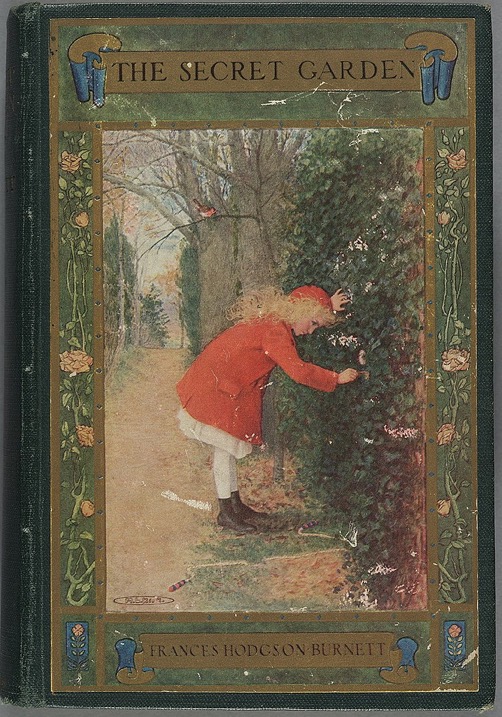
Maria Louise Kirk: Cover Illustration for the 1911 American edition of Frances Hodgson Burnett's The Secret Garden.
" … mostly redactions in any transcript."
I live three simultaneous lives: a public, a private, and a secret one. I might refer to my public life as my nine-to-five life. It entails my out-there encounters. My private life's the one I primarily live at home; me and my family're privy to this one, along with my very closest friends. My SecretLife includes all my activities I mention to nobody, ever. It includes more than nose-picking, and entails much of what I find embarrassing to tell. We each maintain all three of these lives, in varying proportions and degrees. A mid-career professional might allocate much more than half their time to maintaining their public presence. Newlyweds slip into full time private time when they depart on their honeymoon, then, over time, allocate a much smaller proportion to engaging in their relationship. Through it all, we each maintain at least a small part of every day to our secret activities, if only for the sake of maintenance. Nobody ever gets to watch me shave. I understand that some families (shudder) maintain an open door bathroom policy which both my privacy life and my secrecy life abhor. I'm a dedicated bathroom door closer, myself.
During normal times, a rhythm emerges and seems to maintain itself, with public, private, and secret times seeming to balance themselves.
NewNormalScene
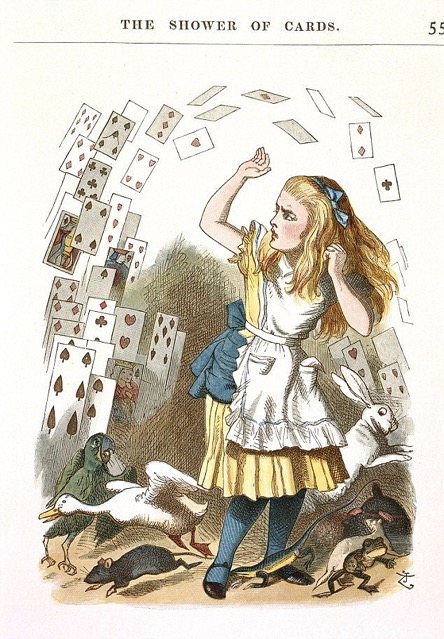
A shower of cards in Alice in Wonderland from the color illustrated Nursery Alice published in 1890 with illustrations by John Tenniel
" Coping must mean that I'm still noticing differences without taking them as necessarily definitive."
If there's an art to adapting, it's for certain a dark one not taught in any higher learning institution. It seems a low sort of learning, imposed rather than chosen, and however much I might crow about my own resilience, I can assure you that it's all bullshit. There never were any masters of resilience and not only because there never could have been. You see, mastery demands an object exhibiting certain replicabilities, patterns emerging at least somewhat regularly, where practice might prove possible. Nobody ever improves their innate ability to predict what random number might emerge next. Likewise, each emerging NewNormalScene will likely never seem completely normal. Nostalgia taints assimilation. One cannot help comparing and finding the new thing wanting. These days never seem very much like the good old ones.
Saturday morning comes and I still feel a reassuring compulsion to head over to Davey's Diner for a platter of loaded hash browns.
Complaintant
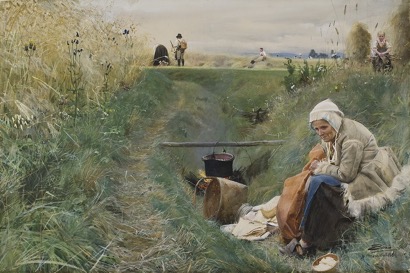
Anders Zorn: Our Daily Bread (1886)
" … I'm just blowing off stink."
I try not to whine, which under the Negative Objective Rule, means that I catch myself complaining more than I care to openly admit. Just between us, then, I admit to having a hyperactive internal complaint department operating 24/7. It never closes. I occasionally more publicly disclose its workings, but I usually just keep my complaints to myself, if only to demonstrate that I might have been raised right. I learned in my birth family, which featured five kids, just how necessary accommodation tends to be. One complainer can spoil every shared experience for everybody, perhaps most prominently for the complainer. Keep it up, and the belt might come off, encouraged by my mom and administered by my reluctant father, who always preferred to spare the rod, however warranted a punishment might seem. So I graduated into what passed for my adulthood with an advanced degree in stifling, a skill with a spotty record of producing real benefit.
The Damned Pandemic Lockdown has been teaching me complaining's hidden benefit, though.
Widsom

Johannes Moreelse, Vanity (17th Century)
"I might have always been somebody else instead."
If you don't feel crazy sometimes, you're probably insane. The truly insane often feel perfectly sane while the sane only occasionally do. Truth often seems much stranger than fiction and fiction the more readily believable truth. There is no vast world-wide conspiracy trying to convince you that a vast world-wide conspiracy's trying to convince you that a vast world-wide conspiracy's trying to convince you. Nobody's capable of coordinating even a half-vast world-wide conspiracy in a world where most cannot consistently make it to the supper table on time. They're not actually out to get you, though they're very likely to get you, anyway. It's still paranoia, even when nobody's out to get you. Most cannot step into the same river once. Nobody can do it twice. Uncommon wisdom is everywhere, common sense, uncommon. Wisdom is never common. It only comes in the uncommon variety. If you're not confused, you might not be paying close enough attention.
Whoever said that the world should make sense never closely observed this world, for it overflows with absolute nonsense.
Leftovering

Johannes Moreelse: Heraclitus (1630)
"By Epiphany, we will have somehow survived a second surge of Leftovering here."
Was it really just a week ago when I went to bed with my head filled with visions of an impending Thanksgiving dinner? The Muse and I had trundled out to fetch our fresh bird and returned to The Villa feeling supremely well prepared. The Muse had roasted off that little sugar pumpkin, anticipating some pie-making. We tussled a little over whether we should dry or wet brine the bird, a decision I ceded to The Muse, since she would be cooking. We were both salivating in warm anticipation, but that was then. Heraclitus, the so-called weeping philosopher, reveled in pointing out human foibles. He observed much human behavior that clearly couldn't qualify as rational. He noted that the same thing seems completely different from different perspectives while remaining otherwise precisely the same. He might have been foretelling the story of our Thanksgiving, which did, indeed, come the following morning but left a long, long tail behind. Turkey on day six seems a completely different commodity than it did on day one.
Most mornings, when filling the cats' food dish, I wonder if they might prefer a tad more variety in their diet.
Boss

Johannes Moreelse: Democritus (c. 1630)
"If nobody's Boss, it works better."
Anyone who's ever had a Boss has experienced what it's like to work for a complete idiot. This principle counts double for anyone who's ever worked for them self. The hierarchy wobbles top-heavy. If an organization has a cadre of best and brightest, why position them on the head of the pin rather than on the business end, the foundation? A Boss attempts to fulfill a Utopian mission, one rooted in directing others' actions, one doomed to endless short-coming. Nobody told this twenty-five year old budding business executive upon accepting his first supervisory assignment that he would most probably never get the hang of it, that he'd instantly become the most clueless one in the whole damned organization and that he dare not admit it, even to himself. He'd hang in there, pantomiming his own performance while writing performance reviews for people who's contribution he could not have possibly replicated or very deeply appreciated. The more successful subordinates were insubordinate and managed him.
And so it's been through all of my professional life.


